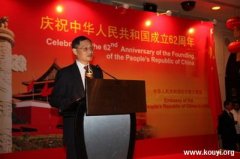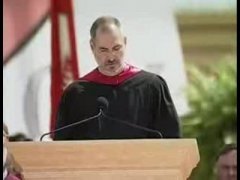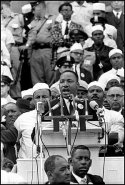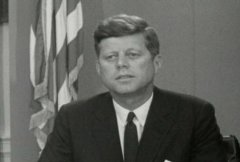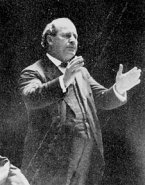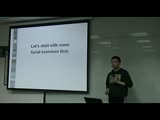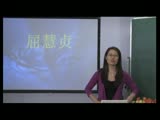美国经典英文演讲100篇:"Religious Belief and Public Morality"
Mario Matthew Cuomo
"Religious Belief and Public Morality"
"The Catholic Church's actions with respect to the interplay of religious values and public policy make clear that there is no inflexible moral principle which determines what our political conduct should be."
[AUTHENTICITY CERTIFIED: Text version below transcribed directly from audio]
Thank you very much, Father Hesburgh, Father McBrien, all the distinguished clergy who are present, ladies and gentlemen:
I am very pleased to be at Notre Dame and I feel very much at home, frankly -- not just because you have seven or eight hundred students from New York state, not just because -- not just because Father McBrien's mother's name is Catherine Botticelli -- a beautiful name -- not just because Father Hesburgh is a Syracuse native, but also because of your magnificent history of great football teams. Oh, the subway -- They mean a lot to us, the...great Fighting Irish. The subway alumni of New York City have always been enthralled. And for years and years all over the state, Syracuse north and south, out on Long Island, people on Saturday's would listen to their radio and now watch their television to watch the great Fighting Irish wearing the Gallic Green. It's marvelous. The names of your great players reverberate back from the years: Nick Buoniconti, Nick Pietrosante, Angelo Bertelli. How about Ralph Guglielmi? What a great player he is.
I want to begin this talk by drawing your attention to the title of the lecture: "Religious Belief and Public Morality: A Catholic Governor's Perspective." I was not invited to speak on "church and state" generally, and certainly not to speak on "Mondale against Reagan." The subject assigned to me is difficult enough. I'll not try to do more than I've been asked.
I'm honored by the invitation, but the record shows that I'm not the first governor of New York State to appear at an event involving Notre Dame. One of my great predecessors, Al Smith, went to the Army-Notre Dame football game each time it was played in New York. His fellow Catholics expected Smith to sit with Notre Dame; protocol required him to sit with Army because it was the home team. Protocol prevailed. But not without Smith noting the dual demands on his affections: "I’ll take my seat with Army," he said, "but I commend my soul to Notre Dame!"
Today, frankly, I'm happy I have no such problem: Both my seat and my soul are with Notre Dame. And as long as Father McBrien or Father Hesburgh doesn't invite me back to sit with him at the Notre Dame-St. John’s basketball game, I'm confident my loyalties will remain undivided. And in a sense, it’s a question of loyalty that Father McBrien has asked me here today to discuss. Specifically, must politics and religion in America divide our loyalties? Does the "separation between church and state" imply separation between religion and politics? Between morality and government? And are these different propositions? Even more specifically, what is the relationship of my Catholicism to my politics? Where does the one end and the other begin? Or are they divided at all? And if they're not, should they be?
These are hard questions. No wonder most of us in pubic life -- at least until recently -- preferred to stay away from them, heeding the biblical advice that if "hounded and pursued in one city," we should flee to another. Now, however, I think that it's too late to flee. The questions are all around us; the answers are coming from every quarter. Some of them have been simplistic; most of them fragmentary; and a few, spoken with a purely political intent, demagogic. There's been confusion and compounding of confusion, a blurring of the issue, entangling it in personalities and election strategies, instead of clarifying it for Catholics, as well as for others.
Today, I'd like to try -- just try -- to help correct that. And of course I can offer you no final truths, complete and unchallengeable. But it's possible that this one effort will provoke other efforts -- both in support and contradiction of my position -- that will help all of us to understand our differences and perhaps even discover some basic agreement. In the end, I am absolutely convinced that we will all benefit if suspicion is replaced by discussion, innuendo by dialogue, if the emphasis in our debate turns from a search for talismanic criteria and neat but simplistic answers to an honest, more intelligent attempt at describing the role that religion has in our public affairs, and the limits placed on that role. And if we do it right -- if we're not afraid of the truth even when the truth is complex -- this debate, by clarification, can bring relief to untold numbers of confused, even anguished Catholics, as well as to many others who want only to make our already great democracy even stronger than it is.
I believe the recent discussion in my own state has already produced some clearer definition. As you may know, in early summer an impression was created in some quarters that official Church spokespeople would ask Catholics to vote for or against specific candidates on the basis of their political position on the abortion issue alone. I was one of those that was given that impression. Thanks to the dialogue that ensued over the summer -- only partially reported by the media -- we learned that the impression was not accurate.
Confusion had presented an opportunity for clarification, and we seized it. Now all of us -- all of us are saying one thing, in chorus, reiterating the statement of the National Conference of Catholic Bishops that they will not take positions for or against specific political candidates, and that their stand -- the stand of the bishops and the cardinals -- on specific issues should not be perceived as an expression of political partisanship.
Now, of course the bishops will teach -- they must teach -- more and more vigorously, and more and more extensively. But they have said they will not use the power of their position, and the great respect it receives from all Catholics, to give an imprimatur to individual politicians or parties. Not that they couldn't do it if they wished to -- some religious leaders, as you know, do it. Some are doing it at this very moment. And not that it would be a sin if they did. God does not insist on political neutrality. But because it is the judgment of the bishops, and most of us Catholic laypeople, that it is not wise for prelates and politicians to be too closely tied together.
Now, I think that getting this consensus in New York was an extraordinarily useful achievement. And now, with some trepidation, I take up your gracious invitation to continue the dialogue in the hope that it will lead to still further clarification.
Let me begin this part of the effort by underscoring the obvious. I do not speak as a theologian; I don't have that competence. I do not speak as a philosopher; to suggest that I could, would be to set a new record for false pride. I don’t presume to speak as a "good" person, except in the ontological sense of that word. My principal credential is that I serve in a position that forces me to wrestle with the problems that you've come here to study and to debate.
I am by training a lawyer and by practice a politician. Now, both those professions make me suspect in many quarters, including -- including some of my own coreligionists. Maybe there's no better illustration of the public perception of how politicians unite their faith and their profession than the story they tell in New York about "Fishhooks" McCarthy, a famous Democratic leader. (He actually lived.) "Fish Hooks" McCarthy lived on the Lower East Side. He was right-hand man to Al Smith, the prototypical political person of his time. "Fishhooks," the story goes, was devout. So devout that every morning on his way to Tammany Hall to do his political work, he stopped into St. James Church on Oliver Street in downtown Manhattan, fell on his knees, and whispered every morning the same simple prayer: "O, Lord, give me health and strength. We'll steal the rest."
"Fishhooks" notwithstanding, I speak here as a politician; and also as a Catholic, a layperson baptized and raised in the pre-Vatican II Church, educated in Catholic schools, attached to the Church first by birth, then by choice, now by love; an old-fashioned Catholic who sins, regrets, struggles, worries, gets confused, and most of the time feels better after confession. The Catholic Church is my spiritual home. My heart is there, and my hope.
But there is, of course, more to being a Catholic than a sense of spiritual and emotional resonance. Catholicism is a religion of the head as well as the heart, and to be a Catholic is to say, "I believe," to the essential core of dogmas that distinguishes our faith. The acceptance of this faith requires a lifelong struggle to understand it more fully and to live it more truly, to translate truth into experience, to practice as well as to believe. That's not easy: applying religious belief to everyday life often presents difficult challenges. And it's always been that way. It certainly is today. The America of the late twentieth century is a consumer society, filled with endless distractions, where faith is more often dismissed than challenged, where the ethnic and other loyalties that once fastened us to our religion seem to be weakening.
In addition to all the weaknesses, all the dilemmas, all the temptations that impede every pilgrim's progress, the Catholic who holds political office in a pluralistic democracy, a Catholic who is elected to serve Jews and Muslims and atheists and Protestants, as well as Catholics, bears special responsibility. He or she undertakes to help create conditions under which all can live with a maximum of dignity and with a reasonable degree of freedom; where everyone who chooses may hold beliefs different from specifically Catholic ones, sometimes even contradictory to them; where the laws protect people's right to divorce, their right to use birth control devices, and even to choose abortion.
In fact, Catholic public officials take an oath to preserve the Constitution that guarantees this freedom. And they do so gladly, not because they love what others do with their freedom, but because they realize that in guaranteeing freedom for all, they guarantee our right to be Catholics: our right to pray, our right to use the sacraments, to refuse birth control devices, to reject abortion, not to divorce and remarry if we believe it to be wrong.
The Catholic public official lives the political truth that most Catholics through most of American history have accepted and insisted on: the truth that to assure our freedom we must allow others the same freedom, even if occasionally it produces conduct by them which we would hold to be sinful. I protect my right to be a Catholic by preserving your right to be a Jew, or a Protestant, or a nonbeliever, or anything else you choose. We know that the price of seeking to force our belief on others is that they might someday force their belief on us.
Now, this freedom is the fundamental strength of our unique experiment in government. In the complex interplay of forces and considerations that go into the making of our law and policies, its preservation, the preservation of freedom, must be a pervasive and dominant concern.
But insistence on freedom is easier to accept as a general proposition than in its applications to specific situations because there are other valid general principles firmly embedded in our Constitution, which, operating at the same time, create interesting and occasionally troubling problems. Thus, the same amendment of the Constitution that forbids the establishment of a state church affirms my legal right to argue that my religious belief would serve well as an article of our universal public morality.
I may use the prescribed processes of government -- the legislative and executive and judicial processes -- to convince my fellow citizens, Jews and Protestants and Buddhists and nonbelievers, that what I propose is as beneficial for them as I believe it is for me. But it's not just parochial or narrowly sectarian but fulfills a human desire for order, for peace, for justice, for kindness, for love, for any of the values that most of us agree are desirable even apart from their specific religious base or context.
I'm free to argue for a governmental policy for a nuclear freeze not just to avoid sin, but because I think my democracy should regard it as a desirable goal. I can, if I wish, argue that the state should not fund the use of contraceptive devices not because the Pope demands it, but because I think that the whole community -- for the good of the whole community -- should not sever sex from an openness to the creation of life. And surely I can, if I am so inclined, demand some kind of law against abortion, not because my bishops say it is wrong, but because I think that the whole community, regardless of its religious beliefs, should agree on the importance of protecting life -- including life in the womb, which is at the very least potentially human and should not be extinguished casually.
Now, no law prevents us from advocating any of these things. I am free to do so. So are the bishops. So is Reverend Falwell. In fact, the Constitution guarantees my right to try. And theirs. And his.
But should I? Is it helpful? Is it essential to human dignity? Would it promote harmony and understanding? Or does it divide us so fundamentally that it threatens our ability to function as a pluralistic community? When should I argue to make my religious value your morality? My rule of conduct your limitation? What are the rules and policies that should influence the exercise of this right to argue and to promote?
Now, I believe I have a salvific mission as a Catholic. Does that mean I am in conscience required to do everything I can as governor to translate all of my religious values into the laws and regulations of the State of New York or of the United States? Or be branded a hypocrite if I don’t? As a Catholic, I respect the teaching authority of my bishops. But must I agree with everything in the bishops' pastoral letter on peace and fight to include it in party platforms? And will I have to do the same for the forthcoming pastoral on economics even if I am an unrepentant supply-sider? Must I, having heard the pope once again renew the Church's ban on birth control devices as clearly as it's been done in modern times -- must I as governor veto the funding of contraceptive programs for non-Catholics or dissenting Catholics in my state? I accept the Church's teaching on abortion. Must I insist that you do by denying you Medicaid funding? By a constitutional amendment? And if by a constitutional amendment, which one? Would that be the best way to avoid abortions or to prevent them?
Now, these are only some of the questions for Catholics. People with other religious beliefs face similar problems. Let me try some answers.
Almost all Americans accept the religious values as a part of our public life. We are a religious people, many of us descended from ancestors who came here expressly to live their religious faith free from coercion or repression. But we are also a people of many religions, with no established church, who hold different beliefs on many matters. Our public morality, then -- the moral standards we maintain for everyone, not just the ones we insist on in our private lives -- depends on a consensus view of right and wrong. The values derived from religious belief will not -- and should not -- be accepted as part of the public morality unless they are shared by the pluralistic community at large, by consensus. So that the fact that values happen to be religious values does not deny them acceptability as part of this consensus. But it does not require their acceptability, either.
Think about it: The agnostics who joined the civil rights struggle were not deterred because that crusade's values had been nurtured and sustained in black Christian churches. And those on the political left are not perturbed today by the religious basis of the clergy and laypeople who join them in the protest against the arms race and hunger and exploitation.
The arguments start when religious values are used to support positions which would impose on other people restrictions that they find unacceptable. Some people do object to Catholic demands for an end to abortion, seeing it as a violation of the separation of church and state. And some others, while they have no compunction about invoking the authority of Catholic bishops in regard to birth control and abortion, might reject out of hand their teaching on war and peace and social policy.
Ultimately, therefore, what this means is that the question whether or not we admit religious values into our public affairs is too broad to yield to a single answer. Yes, we create our public morality through consensus and in this country that consensus reflects to some extent the religious values of a great majority of Americans. But no, all religiously based values don't have an a priori place in our public morality. The community must decide if what is being proposed would be better left to private discretion than public policy, whether it restricts freedoms, and if so to what end, to whose benefit, whether it will produce a good or bad result, whether overall it will help the community or merely divide it.
Now, the right answers to these terribly subtle and complex questions can be elusive. Some of the wrong answers, however, are quite clear. For example, there are those who say there is a simple answer to all these questions; they say that by history and by the practice of our people we were intended from the beginning to be -- and should be today -- a Christian country in law. But where would that leave the nonbelievers? And whose Christianity would be law, yours or mine? This "Christian nation" argument should concern -- even frighten -- two groups in this society: non-Christians and thinking Christians. And I believe it does.
I think it's already apparent that a good part of this nation understands -- if only instinctively -- that anything which seems to suggest that God favors a political party or the establishment of a state church is wrong and dangerous. Way down deep the American people are afraid of an entangling relationship between formal religions -- or whole bodies of religious belief -- and government. Apart from the constitutional law and apart from religious doctrine, there's a sense that tells us it's wrong to presume to speak for God or to claim God's sanction of our particular legislation and his rejection of all other positions. Most of us are offended when we see religion being trivialized by its appearance in political throwaway pamphlets. The American people need no course in philosophy or political science or Church history to know that God should not be made into a celestial party chairman.
To most of us, the manipulative invoking of religion to advance a politician or a party is frightening and divisive. The American public will tolerate religious leaders taking positions for or against candidates, although I think the Catholic bishops are right in avoiding that position. But the American people are leery about large religious organizations, powerful churches, or synagogue groups engaging in such activities -- again, not as a matter of law or doctrine, but because our innate wisdom and our democratic instinct teaches us these things are dangerous for both sides -- dangerous for the religious institution, dangerous for the rest of our society.
Now, today there are a number of issues involving life and death that raise questions of public morality. And they are also questions of concern to most religions. Pick up a newspaper -- almost any newspaper -- and you're almost certain to find a bitter controversy over any one of these questions: Baby Jane Doe, the right to die, artificial insemination, embryos in vitro, abortion, birth control -- not to mention nuclear war and the shadow that it throws across all of existence.
Now, some of these issues touch the most intimate recesses of our lives, our roles as someone's mother or child or husband; some affect women in a unique way. But they are also public questions, for all of us -- public questions, not just religious one[s]. Put aside what God expects. Assume, if you like, that there is no God. Say that the Supreme Court has taken God entirely out of our civics. Then the greatest thing still left to us, the greatest value available to us, would be life -- life itself. Even a radically secular world must struggle with the questions of when life begins, under what circumstances it can be ended, when it must be protected, by what authority; it, too, must decide what protection to extend to the helpless and the dying, to the aged and the unborn, to life in all of its phases.
Now, as a Catholic, I have accepted certain answers as the right ones for myself and for my family, and because I have, they have influenced me in special ways, as Matilda’s husband, as a father of five children, as a son who stood next to his own father's deathbed trying to decide if the tubes and the needles no longer served a purpose. As a governor, however, I am involved in defining policies that determine other people's rights in these same areas of life and death. Abortion is one of these issues, and while it is only one issue among many, it is one of the most controversial and affects me in a special way as a Catholic public official. So let me spend a little time considering it.
I should start, I believe, by noting that the Catholic Church's actions with respect to the interplay of religious values and public policy make clear that there is no inflexible moral principle which determines what our political conduct should be. Think about it. On divorce and birth control, without changing its moral teaching, the Church abides the civil law as it now stands, thereby accepting -- without making much of a point of it -- that in our pluralistic society we are not required to insist that all our religious values be the law of the land. The bishops are not demanding a constitutional amendment for birth control or on adultery.
